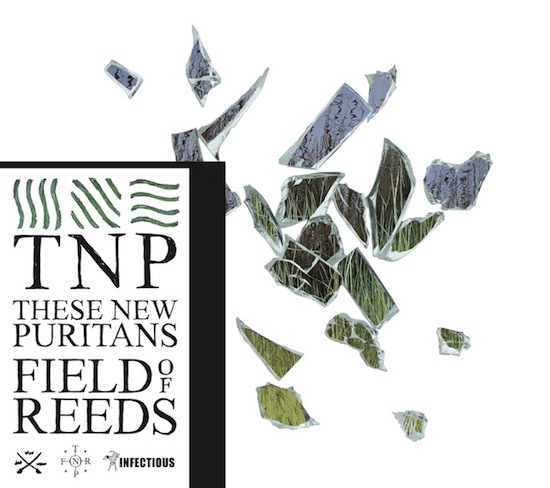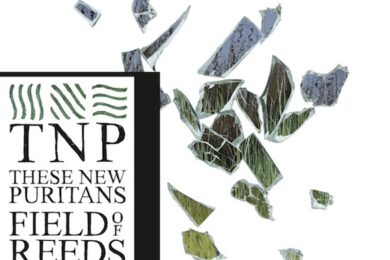I received an e-mail from Graham Sutton back in February saying he was finishing a new album with These New Puritans (their third, and second to be co-produced by Sutton alongside These New Puritans’ Jack Barnett), which they’d been working on for the whole of 2012. Nothing unusual in that, you might think, except that Graham also said: “I think it’s the finest project I’ve ever been involved in”. He’s previously been involved in some fine projects.
Listening to it some three and a half months later, while ensconced in the Sardinian countryside (no, it wasn’t some elaborate, secret listening party; I just happened to get hold of a preview copy the day before I went on holiday for a week), I can understand exactly why Sutton would say that. He’s produced records for the likes of British Sea Power, Jarvis Cocker and Delays in the past, and his own music (under the Bark Psychosis and Boymerang names) has veered from eclectic, experimental urban post-rock to serious drum and bass. But he’s never been involved in anything quite like this before.
Field Of Reeds is the follow-up to Hidden, a beast of a record containing moments of neoclassical orchestration in between massive Japanese taiko drums, pumping percussion and aggressive riffs and electronics. It literally rubbed Edward Elgar and contemporary English classical composers like John Rutter and Richard Rodney Bennet up against hip hop-derived rhythms and mixing techniques and post-punk guitars.
Hidden felt like a seismic leap forward from the abstract Wire-meets-Liars-meets-Aphex Twin shadings of their debut album, Beat Pyramid, and their early hook-ups with fashion houses like Dior Homme (drummer George Barnett is also a model). Although, to be fair, even back then their music, and the way they presented it, was always loaded with signifiers way out of the frame of reference of their contemporaries, and they proudly stood somewhere far, far on the margins of the ‘indie landfill’ masses that some feckless commenters tried to lump them in with.
Given the leap from Beat Pyramid to Hidden, I had no idea where These New Puritans might go with Field Of Reeds. And to be honest, even now I’ve listened to it a handful of times, I’m still note entirely sure where it is they’ve gone and what it is they’ve done. Largely shorn of beats, guitars, and other identifiable signifiers of ‘rock’ music, Jack Barnett, an autodidact, has taught himself classical composition, and the result is, well, something very unusual and compelling.
Field Of Reeds has nine tracks, divided loosely into a triptych of three songs each, and runs to 53 minutes in length. It contains string and woodwind players, brass, Magnetic Resonator Piano, a children’s choir, the Portuguese jazz singer Elisa Rodrigues, and entire other worlds.
‘This Guy’s In Love With You’
It starts with the quietest, most distant piano, almost as delicate and isolated as the piano which opens Mark Hollis’ solo album. An even more distant female voice (presumably Elisa Rodrigues, although who knows) sings a different song (literally; Bacharach and David’s “This Guy’s In Love With You”) through a heavy curtain, or from across a body of water, or over a great stretch of time. Everything fades to mournful horns. The piano returns. The voice returns. A bloom of bass and a whisper of strings. The woman’s distant voice, whether it’s Elisa or not, is beautiful; there are just snatches of the melody and words discernable. It’s like remembering a song, rather than hearing it. A high trumpet line and a widescreen organ. Everything moves very slowly. And then nothingness. The song never really seems to begin. And is beautiful because of that.
‘Fragment Two’
A repeating piano riff opens ‘Fragment Two’, which will end up being the catchiest ‘hook’ on an album that has no interest in being catchy. Jack Barnett’s voice this time, a cracked mumble, not quite singing, not quite speaking. A kick drum. Pauses for distant strings and electric bass. “Something is there. There is something there.” Keys add light into dark corners. And then drums, a snare added to the bass, skipping. Horns. Barnett moans, becomes surrounded. I have no idea what he’s singing. I’d be hard pressed to describe this as a song. I’m not sure what it is. But it’s the most song-like thing here. You couldn’t sing along with it. In many ways ‘Fragment Two’ feels like a progeny of Hidden; the sonic palette of that record continued, but the compositional patterns disintegrating as you try grasp them. It’s incredibly rich, musically; a lone trumpet, again, trills a fanfare that’s not quite solemn, not quite joyful. The mix is utterly beautiful.
‘The Light In Your Name’
A subdued organ gives rise to a vocal where you can hear Jack Barnett’s lips part more than the words he’s enunciating. A hesitant piano, avoiding patterns yet again, and a glisten of guitar somewhere very far away in the periphery. Angelic backing vocals. This is most definitely not ‘rock’ music. There’s a prolonged, sustained, pained note, played on strings, which feels like something from late-period Talk Talk in the way it develops tension by not moving. Electronic interference and percussion occasionally stretch the edges of the sound, threaten to pull it apart, and then vanish. A female voice again, which must be Elisa this time. When and where would you listen to this record? What is this music for? Drums eventually break into the tumescent arrangement and swell tensions further. Glass breaks. Piano keys slam. Disappearance. Somehow this record is emotional, intellectual, and visceral all at once.
‘V (Island Song)’
Arguably, if not quite literally, the album’s centrepiece, this multi-segmented composition begins the second part of the triptych. Piano and voice to start, with incredibly distant strings or horns (they’re so distant it’s hard to tell). Barnett moans, his voice a wordless drone, as electronic frequencies and skittering drums enter; he finds words of more portent. The drums and electronics fade to just piano, and then return, more powerful, more… not chaotic, because they’re measured, controlled… but they suggest chaos, somewhere. “Not the broken / not the crowd,” Jack sings. You could spend years decoding these words. “Not the suspect / not the victim / I am the reason / not the question / not the answer.” It elongates and stretches, strings and pianos leading drums, subcutaneous electronics pushing from beneath. At times it’s almost like a chamber-quartet recreating something from the new Knife album. All but drums and an organ dissipate. It becomes essentially a drone and drum groove to close. Nearly 10 minutes in length. Extraordinary.
‘Spiral’
A strange amalgam of voices, strings, brass, and tones from unidentifiable sources (perhaps that Magnetic Resonator Piano). It is ominous and uncomfortable. Occasionally there’s a glimpse of light from a horn, or a shard of feedback, or a recognisable voice. Motifs and melodies almost form over waves of this sound. Is that the children’s choir? I could imagine Barnett moving into film soundtrack work from here. But the films would be… particular. There is woodwind. Barnett’s voice, when it arrives, is almost an alien element here, a strange reminder of urbanity and modernity in a very rural setting. No drums, no guitars; These New Puritans are completely transformed from what they were once recognisable as.
‘Organ Eternal’
Philip Glass-esque, perhaps; an organ motif with padding, electronic bass beneath it, the melody mimicked by a piano and a xylophone or glockenspiel too, repeats, repeats, repeats, deliciously, upliftingly. Occasionally the whole song somehow inhales; there are strange noises in the periphery which make you look outside your headphones or speakers; samples perhaps, albeit reconstructed, of human voices? The looping vanishes, hi-hats come in, Barnett moves to the microphone again, briefly, barely. A transition to strings and woodwind, and then the motif comes back again, hypnotic. Again, this is not a ‘pop’ song or a ‘rock’ song. But it is fascinating and beautiful.
‘Nothing Else’
A lone trumpet, forlorn but not bereft. Then strings and woodwind. Barnett’s voice and Elisa’s again, mirroring each other, but only present briefly each time, rising and fading in the arrangement. Once more there are no drums; some bass frequencies, but other than that almost no evidence of a ‘band’, as most people would understand the term. A dramatic horn climax that threatens but never overspills.
‘Dream’
A solo female voice starts the song; again, if it is a song – ‘composition’ seems a more apposite word. There’s a glimmer of keys, bass, percussion. The arrangement rises and falls around the vocals. After that initial glimmer, there are no drums, again no trace of a band at all. Not even Jack’s voice. After the percussive weight of Hidden, this seems bizarre to say the least, but in the context of Field Of Reeds it makes sense. The final third of the album, from ‘Nothing Else’ onwards, feels like it contains no drums at all; there’s certainly nothing that would drive the music forward. Instead, it finds its own stately pace of travel.
‘Field Of Reeds’
Choir, strings, Barnett painting his voice into corners, sounding a little like Robert Wyatt. This is yet another complex, austere composition and arrangement; by this point it’s clear that These New Puritans have, at least for the time being, left the realms of rock and pop music far behind. You’d have to be deranged to try and call this ambient or post-rock or any other two-bit ‘experimental’ genre you care to mention. Everything is meticulously composed and arranged (not to mention recorded and mixed), utterly deliberate and purposeful. I’m massively impressed – awed, even – by this record, but I have no idea when I’ll listen to it, how I’ll use it. It’s unlike anything else I own, I think; there are shades of Scott Walker, Swans, Talk Talk, Björk, many other things experimental and austere, but really, for the most part, Field Of Reeds is something else completely.
These New Puritans play London Heaven on Thursday June 19th, info here



